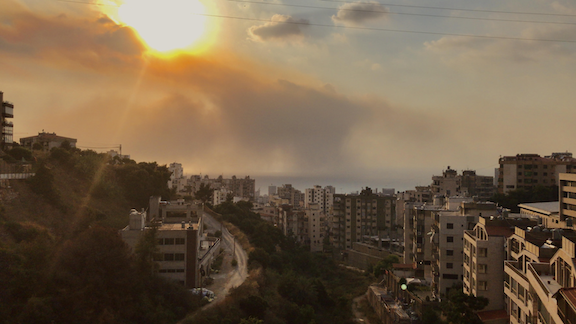By The Armenian Weekly | Saturday, 08 August 2020

The Beirut sky (Photo by Shahen Araboghlian)
BY SHAHEN ARABOGHLIAN
From The Armenian Weekly
The most beautiful sunset I’d seen over the Beirut horizon was only yesterday. It was a magnificent fusion of smooth, peachy orange; pink cotton candy; with a bright blue backdrop—all full of toxic nitrates released from the traumatic explosion in Beirut. I write these sentences out of rage—a dominant feeling—with a pinch of numbness. Numbness that pushed me awake through the night, writing this piece.
It was almost power-cut o’clock in Lebanon, which is almost every hour, on a calm Tuesday afternoon. When I say calm, it’s very relative. It’s calm because no company or institution made hundreds of employee layoffs today; it’s calm because the internet still worked until 6:00 p.m.; it’s calm because I haven’t heard of a suicide attempt today; it’s calm because the exchange rate has stabilized, albeit at unimaginable heights. It was calm but at a cost.
A short shake startles me on the hilltop of my home in Mezher. Easy, earthquake. We’ve been over this Jumanji stage before. And then, a tiny boom. Something nearby blew up, I think. And then, a proper shake, which takes me stumbling over to my room door, in confusion. This has become a dangerous earthquake; we need to take cover. I look out my window to see the Homenetmen Stadium’s large window panes blow into pieces, and then, a deafening boom.
For a moment, I was sure we were getting bombed. For a moment, I was confident that all I was hearing were airstrikes approaching us from afar, and in the next few milliseconds, we would be next. I froze. I didn’t run. You can’t run from an airstrike. I stood there and accepted death.
Spoiler alert: it never came. I had to shuffle passports and paperwork and laptops into a backpack in case the third strike gave me a chance to run to the building basement. But the third strike never came, because it was never a strike. It was an explosion, and mom knew, because the Civil War still lingers in the daily memory of my parents’ generation. They can differentiate between airstrikes, missiles, mortars and bombs.
Whatever was left of Beirut vanished within minutes. The bars that squeezed their last pennies out in Mar Mkhayel, the almost-empty stores in Gemmayze, and the rest of already-suffering Beirut were all heavily hit. You forget about your fresh trauma and start calling around to check if your loved ones are fine, and hopefully alive, begging the “calling” screen to turn into “00:01.”
Over the next few hours, you see it all, and then some. You see the movie scenes of the exploding mushroom cloud, perishing all in its way. You see the Instagram page set up for the 200+ souls who haven’t been found yet and wonder how their families’ sleeplessness is so different from yours. You see underfunded Red Cross volunteers, scrambling to pull dead-or-alive bodies out of burning debris. You see homes, shelters and buildings—unlivable. You see doctors performing surgeries with smartphone flashlights, open-air, because our hospitals are underfunded and at full capacity. You see videos of children screaming that they don’t want to die.
And you count your blessings.
You read all about Lebanese resilience, everywhere. We party through pain; we’re happy through hardships; we conquer calamities and catastrophes. But not anymore.
You’re asked to close your windows to limit toxin inhalation, but my window is in pieces on the floor. You’re expected to rebuild what is broken, but my money has been confiscated by the bank.
It kicks in. You realize, this is it. This isn’t the Lebanon I grew up in anymore. This Lebanon hosts poverty, disease, anger, frustration, hunger, anxiety and depression. This Lebanon spits in the faces of the underprivileged, of the foreign worker, of minorities. You decide you want nothing to do with this Lebanon anymore. The Lebanon I know can only be reconstructed in dreams and memories. The Lebanon I know no longer wants to be reconstructed because it is unable to. The phoenix can only rise from the ashes so many times.
And in those ashes, there is another Lebanon:
The Lebanon I know stands in line to donate blood, less than half an hour after the shambles.
The Lebanon I know selflessly helps the wounded.
The Lebanon I know creates donation links and shares tweets and Instagram stories and Facebook posts, asking the diaspora—and the world—for assistance.
The Lebanon I know always finds its way out of the dust and rubble.
But the people of Lebanon can only handle so much.
I write these sentences in rage, but in them too is love for this nation and for her people. Eventually, the rage will subside, making way for total numbness. The Lebanon I know is at a tipping point, and the Paris of the Middle East is a tale of bygones.
comments
Կոչ Հայութեան ու Հայրենիքի Իշխանութեան
Editorial:1918-2024. The Struggle for Independent, Sovereign Statehood Continues
Armenia Media Updates: 29 March 2023 Edition
Armenia Media Updates: 23 March 2023 Edition
#TogetherForSyria Telethon Raises over $110,000 for Armenians In Syria
10 August 2022: Week to Week by Armenia Media with Shahen Araboghlian
3 July 2022: Week to Week by Armenia Media with Shahen Araboghlian
17 June 2022: Week to Week by Armenia Media with Shahen Araboghlian